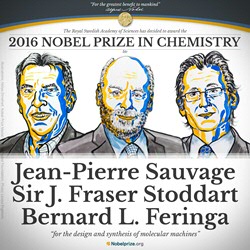The Nobel Prize
The Nobel Prize is widely regarded as the most prestigious award in the fields of literature, medicine, physics, chemistry, peace and economics. For any scientist, it is a great honour and a formal acknowledgement of many years of research.
The University of Groningen has also produced a number of Nobel laureates, the best known of whom are Ben Feringa (chemistry) and Frits Zernike (physics).

Ben Feringa and the molecule machines
Ben Feringa received the Nobel Prize for Chemistry in 2016 for his discovery of the ‘molecular machine’, a light-driven rotating molecule, in 1999. One of the potential applications of these machines is the distribution of medicine to particular locations in the human body.
Feringa, and two fellow scientists, were awarded the Nobel Prize for this major discovery in 2016.
Frits Zernike under the microscope

Frits Zernike was a professor at the University of Groningen from 1915 onwards. His invention of the phase contrast microscope led to a major breakthrough: it was now possible to study living cells and bacteria under a microscope. Zernike won the Nobel Prize for Physics in 1953 for his invention of the phase contrast microscope.
Other Nobel laureates
Less well known but also associated with the University of Groningen were two other Nobel Prize winners: Heike Kamerlingh Onnes (physics, 1913) and Albert Szent-Györgyi (medicine, 1937). Both carried out important research at the University for which they would later receive a Nobel Prize.
What was Szent-Györgyi’s fascination with bell peppers? Why did Kamerlingh Onnes have the coldest lab in Leiden? Find out more about these Nobel laureates.
